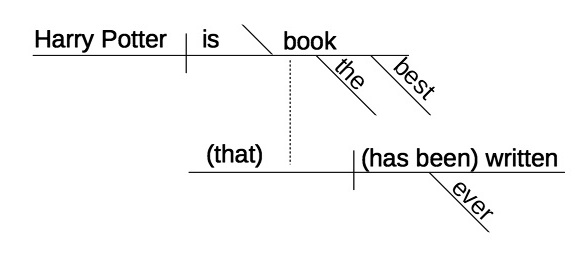This is an excellent question to illustrate some rules of English grammar. Let's first analyze the sentence "Harry Potter is the best book ever written" from your friend's (correct) point of view that the sentence is not in the passive voice:
Independent clause: Subject-Verb-Predicate Nominative.
Subject = "Harry Potter"
Verb (copulative), present tense = "is"
Predicate Nominative = "book"
Article (definite) modifying book = "the"
Adjective (superlative) modifying book = "best"
We now have to decide what to do with "written." Is it a past particle, modifying "book"? This seems unlikely. First of all, almost all books are written, and the Harry Potter series certainly was. Secondly, the claim isn't that Harry Potter is the "best written" book, but the best overall book. So that means that "written" must be a reduced relative clause, "(that) (was) ever written":
Dependent clause: (Subject)-Verb
(Subject) elided relative pronoun, antecedent "book" = ("that")
Verb, passive voice, present perfect tense = "(has been) written"
Adverb, temporal, modifying (has been) written = "ever"

Now let's try out your passive voice version:
Independent clause: Subject-Verb
Subject = "Harry Potter"
Verb, passive voice, present tense = "is written"
(Preposition of agency) = ("by")
(Object of preposition, the agent) = (Agent)
The Agent is left unstated, but that's OK. It happens in many passive-voiced sentences. And, in any case, we know it's J. K. Rowling. If you're right, we can substitute her name for the agent and transform the sentence into the active voice by making the Agent, the new subject and the subject, the new direct object. We get "J. K. Rowling writes Harry Potter."

Now, we've got several problems. The first is the present tense. That was fine when "is" was the verb because that's the enduring present, which properly describes an ongoing situation: Harry Potter was the best book when Rowling completed it, it's the best book now, and it will likely continue to be the best book for some time. But when "is" becomes part of the passive voice of written, we have the statement that JKR is writing the book that she's already written. The sentence would be acceptable in a historical accounting that reported from the past, say, giving a timeline of JKR's life, but that' s not the context of the original sentence
We also don't know what to do with "the best book." We could make it an appositive, renaming Harry Potter: "J. K. Rowling writes Harry Potter, the best book ever." But now we're making up an entirely new sentence, not just transforming an old one into a new one. The Passive<->Action transform rule says nothing about appositives. Not only that, the word "ever" has a different role from the original, where it told us about writing. Here it tells us about the book, calling it essentially "the best-ever book." But the original was talking about eternal writing.
For these reasons, we have to reject the hypothesis that the verb in the original was in the passive voice.


